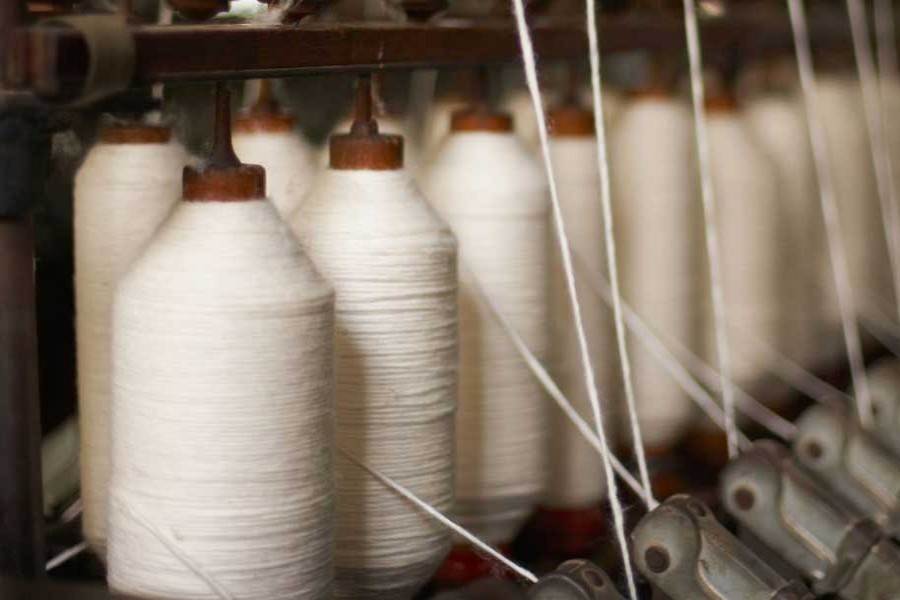Two sectors in Bangladesh's vital clothing industry locked horns in a trade spat as Bangladesh Textile Mills Association (BTMA) opposes apparel makers' move for allowing yarn import through all land ports on the frontier.
The textiles body came with the disapproval Saturday, saying that even partial shipment of yarn from India through the land ports will spell doom on the local backward-linkage industry in the export-oriented sector.
BTMA leaders described readymade garment (RMG) makers' claim about the differences in yarn price in local and international markets as "completely false and ill-motivated" as they (RMG makers) did not mention the price gap in their proposal to the government, comparative with local and international markets.
"The allegation against spinners over the price hike of yarn has been raised in an attempt to damage the backward-linkage industry of the textiles sector," BTMA president Mohammad Ali Khokon said Saturday at a press meet held at Sonargaon Hotel in Dhaka.
Against the backdrop of price hike of yarn on the local market, Bangladesh Garment Manufacturers and Exporters Association (BGMEA) and Bangladesh Terry Towel and Linen Manufacturers and Exporters Association (BTTLMEA) on August 14 and 16 respectively urged the government to allow the import of raw materials, including cotton, yarn, and fabrics, under bonded-warehouse facility through all the land ports between Bangladesh and India for uninterrupted production activities and retaining their competitiveness on the global apparel market.
They also demanded approval from the government for partial shipments in importing raw materials through Benapole and other land ports, especially Bhomra and Sonamasjid, saying that the local yarn prices are much higher compared to other competitor countries'.
Meanwhile, the BTMA president on Thursday sent a letter to the National Board of Revenue opposing the demand of the exporters for partial shipment of yarn imports through all land ports.
The association president at the press meet also said cotton is the main raw material for producing yarn and cotton price had increased 47 per cent since December last year till August'21 while the price of yarn on the local market increased by 37 per cent during the period.
According to BTMA, the price of yarn compared to the price of cotton increased less than 10 per cent.
Besides, the BTMA on August 10 advised its export-oriented yarn makers not to increase further the yarn prices, quoted in the latest proforma invoices (PI) on August 10, and keep the PI valid for at least 15 days instead of the existing seven days.
Since August 10, spinners have sold the widely used 30-carded yarn at prices in-between $4.20 and $4.30 a kilogram, he mentioned.
The spinners might not reduce the yarn price further or keep the existing rate if the cotton price that ranged between 93 and 97 cents per pound globally increases further, he said, adding that the association can't force its members to cut down price.
Regarding price differentials of yarn in local and Indian markets, he said local yarn price is little bit higher than that of India and local exporters are getting some advantages including short-time delivery, long payment time, even more than 120 days, and 4.0-percent cash incentives in purchasing yarn locally.
Regarding approval for yarn import and partial shipments of yarn, he said that, currently, the industry can import raw materials like cotton, yarn, fabrics and others used for readymade garment manufacturing under the bonded-warehouse facility through Benapole while partial imports are allowed only in Chattogram port.
Expressing concern and terming the possible allowance 'suicidal', he alleged that if partial shipment is allowed through Benapole port, many trucks loaded with yarn would enter the country in several shipments under one letter of credit.
"Spinning mills that supply products for domestic market would face uneven competition and face closure due to duty-free import of yarn," he said.
Mr Khokon also apprehends miss-declaration of yarn if import is allowed through all land ports including Bhomra and Sonamasjid, saying high count of yarn might be imported in absence of sufficient infrastructure facilities there.


